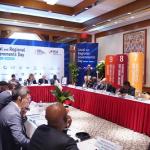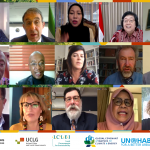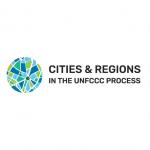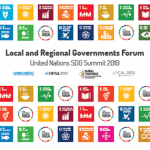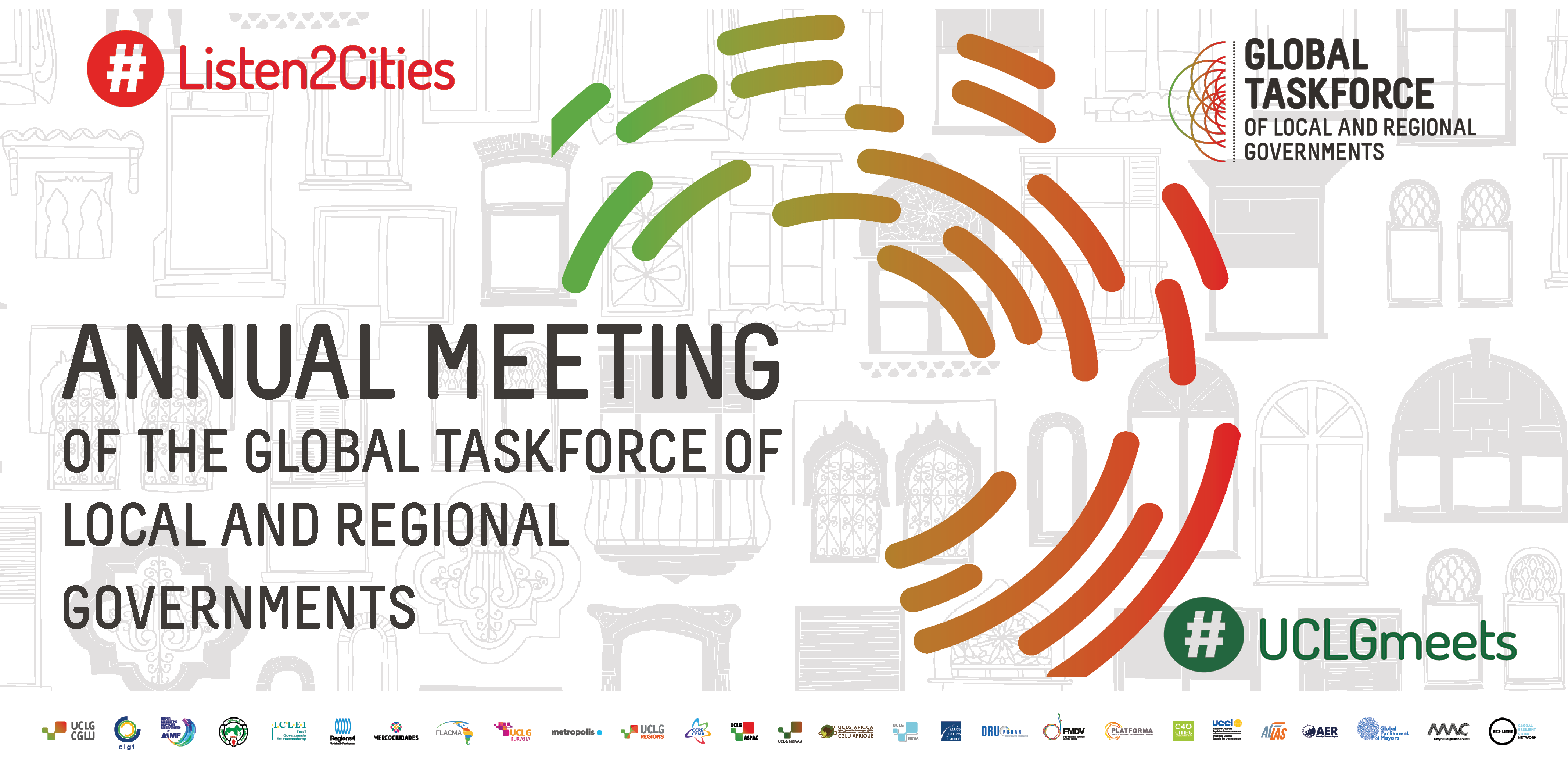
The Annual Meeting of the Global Taskforce took place on Friday, 19 February to provide a space for topics related to pivotal joint advocacy moments of the year. The Global Taskforce formally welcomed the Resilience Cities Network and the Mayors Migration Council. The GTF counts currently with 27 local and regional governments networks working together to enhance the voice of the constituency in the global arena.
Over 200 participants gathered in a session that included representation from all the networks of the Global Taskforce and numerous partners including Cities Alliance; local and regional leaders, and representatives from the United Nations to debate the key priorities of our constituency. Joining forces for sustainability towards COP26, the roadmap towards Habitat III+5 and the opportunities of a year full of summits with gatherings such as Urban 20, CSW65, or the UN Food Systems Summit were the key focus of the exchanges.
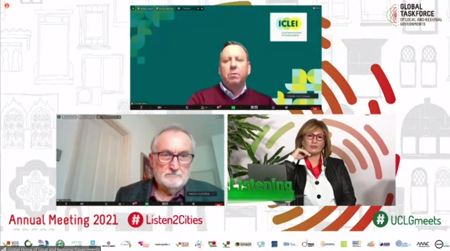
The Session was opened by Gino van Begin, Secretary General, ICLEI, who called on the necessity to continue to work, at all levels, to accelerate sustainability, and to understand the pandemic as a wake-up call to do things differently in the future, citing examples from countries who had committed to multilevel climate action.
“There is an absolute necessity to accelerate sustainability at all levels in the decade of action. The work and understanding for doing things different in the future is now clear to us at all level. In this context we stand ready to demonstrate how to contribute but also to go to the next level in our structural dialogue with the United Nations through the Global Taskforce”.
“Where local and regional governments have been involved in COVID responses, there has been a better response. We need to be very practical in our decentralization messages and persevere on bringing that agenda to the heart of the international discussions, using COVID-19 as an example.” Greg Munro, Secretary General, CGLF
“It is essential to address the needs of the challenges of the urban era outside of this constituency. To link the agendas of cities and informalities and demonstrate how they are interlinked with the green agenda ad COP26. We are ready to contribute to the agenda of this constituency and support the international actions that are being proposed in such an inclusive and organized manner” Billy Cobbett, Director, Cities Alliance.
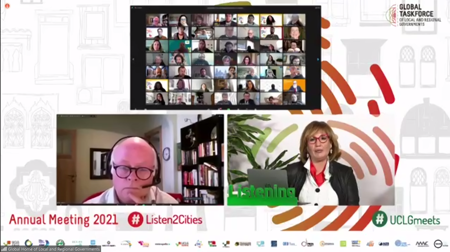
Our joint forces for the sustainability agenda
The session addressed the importance of the climate and ecological transition agenda for our constituency, in a year that will host COP26. Participants reminded of the need for raising climate ambitions in view of the impending need to reach 1,5ºC, and laid out the three axes of our strategy towards the COP based on the LGMA Roadmap presented by ICLEI. The biodiversity agenda was shared by ICLEI, who reported on the CBD process and shared the outcomes of the Global Mayor Groups and Stakeholders Forum, who called to pursue the links between people, the environment, and animal health, as well as for addressing climate, biodiversity loss, and pollution, as one, and as the joint item to call for strengthening multilevel governance to address the climate crisis in all fronts.
Regions 4 shared a roadmap of the Edinburgh Declaration Process, which had the goals of gathering the views of local and regional governments on a global biodiversity framework; defining the inputs for a subnational strategy; calling for a more inclusive biodiversity framework that enables the participation of LRGs; and developing a platform for the constituency to be a part of the implementation. Regions4 and called on members of the Global Taskforce to support the call to action of the process of the Edinburg declaration and mobilize to keep momentum.
Participants highlighted, as well, the potential for the constituency to make efforts into the Race to Zero and Race to Resilience campaigns put in place by COP Champions, to ensure that these races become a platform for LRGs.
“We’re working to develop an agenda in which local and regional governments can have a meaningful participation in COP26 at the highest level possible, to deliver a space that enables these discussions to happen”. Serafin Pazos-Vidal, Head of Brussels Office Convention of Scottish Local Authorities (COSLA).
5 years after Habitat III - What comes next?
With 2021 being the year of the review and follow-up of the New Urban Agenda and Habitat-III, it is critical to reinstate the how New Urban Agenda is at the core of the efforts of our constituency, as a prerequisite for the localization of the SDGs. Representatives from UN-Habitat took the stage to address direct connections between the implementation of the New Urban Agenda and the development and implementation of sub-national urban policies led by local and regional governments around the world.
The World Assembly of Local and Regional Governments, participants agreed, is going to have a critical role this year not just as an event but as a process from our constituency to follow up the New Urban Agenda and to relay powerful joint messages from local and regional governments and to mobilize the constituency around the importance of the New Urban Agenda as a cornerstone of localization.
“The NUA gives us the right scale to implement policies that ensure environmental sustainability, as well as focusing on both equality between people and between territories. We have a major challenge: to establish this territorial dimension to transform our models” Carlos Martínez, Mayor of Soria
2021, a year of summits for our constituency.
Jan Van Zanen, Mayor of The Hague and UCLG Copresident commended the efforts made by all the networks to coordinate and consolidate the Global Taskforce. He stressed the importance of collaboration in order to enhance the reach of our voices and visions. He further highlighted the pertinence of including the Peace Agenda as underlying thread of the work of the constituency. He also called for international solidarity and city/associations development cooperation as critical instrument of the transformative local diplomacy. He recalled the World Forum on Cities of Peace taking place in Mexico, and the annual Geneva Peace Week as critical moments for the constituency.
The U20 Summit was also addressed during the session, with Luca Trifone, Director, International and Interinstitutional Relations, City of Rome, highlighting how the U20 Summit had an opportunity to link the climate agenda with the G20 agenda, due to the 3 focuses placed by the U20 Presidency on green recovery, equitable recovery, and city-centered recovery.
The co-conveners of the Urban20 agreed to ensure links between the discussions at U20 and the agenda of the GTF in all relevant matters.
The Committee on the Status of Women (CSW) meeting in March was introduced by Sabine Freizer, Chief, Leadership and Governance, UN-Women, who addressed how the goal of CSW for the year was the full participation of women in public life and the elimination of violence. It is also the first time that women’s leadership is discussed at CSW, which opens up a critical space to discuss the rights of women at the forefront of the debate.
UCLG informed that the Generation Equality Forum in Mexico will have a local and regional governments session on 30 March. Members were also called to register to the CSW and to participate in the Local and Regional Governments session organized on 17-18 and 22-23 March.
Cecilia Marocchino, Urban Food Agenda Coordinator, Food Systems and Food Safety Division, Food and Agriculture Organization highlighted the opportunities that the UN Food Systems Summit provides for stakeholders to come together and share practices and ideas about sustainable systems to enhance biodiversity, taking into consideration connections between food systems and other systems. The GTF will be convening a Local and Regional Governments Session in order to enhance the visibility of the constituency in this agenda.
UNDESA introduced other critical upcoming events: The UN Ocean Conference, the Second Global Sustainable Transport Conference and the High-Level Dialogue on Energy, all of which considered critical moments for the future of our planet, which need to be followed by our constituency as one.
The need to strengthen our joint work on local finance and a call to all actors to join the conversations around the need to renew the global financial framework to ensure funding reaches local and regional governments was brought up by FMDV in relation to the work developed with UNCDF and UCLG around the Malaga coalition.
Strengthening our joint advocacy with the newest incorporations to the GTF
The Annual Meeting of the Global Taskforce also allowed us to welcome the two newest members of the Global Taskforce to a constituency that already boasts 27 members. The Mayors Migration Council (MMC) and the Resilient Cities Network will be essential to further our agenda on migration, resilience, and the ecological transition, and allow us to strengthen linkages and advocate as one in all spaces.
“We are happy to be a Network that is city-led by committed mayors who are champions of resilience. We are regionally driven, and value partnerships, this is why we attach great importance to this forum” Eugene Zapata, Managing Director for Latin America, Resilient Cities Network
“We’ve been working with members of the GTF on migration at the GFMD, and we saw that work was worth it. Cities had unprecedented levels of participation and exchange on critical aspects. We look forward to enhancing the funding opportunities that we have put in motion with some of the partners here and we are glad to be a part of this constituency” Kate Brick, Deputy Executive Director, MMC
The steps that our constituency needs to undertake.
Participants proposed to develop joint policy recommendations for events in the agenda as well as technical meetings on all the specific processes mentioned in the session.
It was further agreed that proposals would be developed to transform policy materials of the members of the GTF into self-training materials available on line making use of the learning platforms of the different members.
The Annual Meeting of the Global Taskforce came to a close by proposing a structural process for the upcoming World Assembly of with 3 preparatory meetings this year, without all of them having to be political, in May and July, and another one in the second half of the year. It was suggested to bring our shared messages to the preparatory meetings in our conclusions to the World Assembly.
The political meeting at the end of the year could provide the framework to develop a structural annual meeting of the constituency with the United Nations System.

